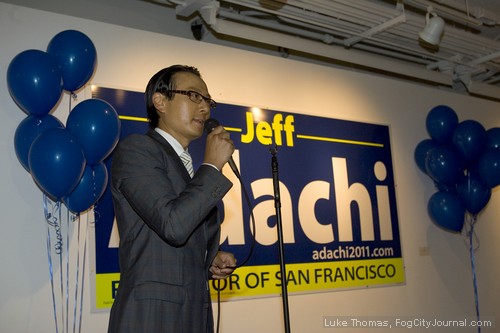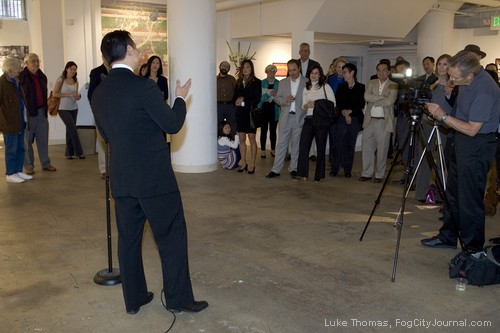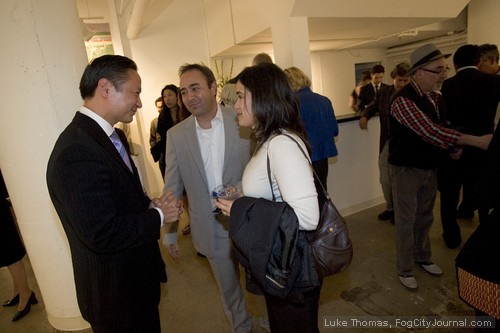
San Francisco Public Defender Jeff Adachi held a fundraiser Tuesday at 30 Hotaling for his campaign for mayor. Photos by Luke Thomas.
By Anne C. Lawrence
August 31, 2011
A Jeff Adachi for Mayor campaign fundraiser held Tuesday at 30 Hotaling in the historic Jackson Square, provided Adachi, a proven leader, successful organizer, defender of justice, winner against San Francisco’s political machine, a fourth generation San Franciscan and filmmaker, writer and Asian Arts Foundation founder – an opportunity to make an appeal to get involved in his campaign.
Co-hosts Francis Mill and yours truly attested to his leadership and organizational skills in forming the Asian Arts Foundation in 1995 including a gala awards night which raised over $150 thousand for artists, writers and filmmakers. Mill introduced Adachi’s wife, Mutsuko, and their 11-year old daughter, Lauren.

Mrs. Kim Lew, Jeff Adachi and wife, Mutsuko, Kan Lew and Mr. Kim Lew.

Co-host Francis Mill.

Co-host Anne Lawrence.

As many as 50 supporters attended the fundraiser.
Adachi’s great grandfather came to San Francisco as a Japanese immigrant in the late 1800s and settled in Bernal Heights. When the earthquake hit in 1906 his family moved to Stockton, California. Adachi was born and raised in Sacramento. His family, one of the 120-thousand Japanese interned during the WWII, lost everything.
“When I learned about what had happened, it really changed my perception of this country,” Adachi said during opening remarks, referring to the internment of Japanese-Americans. “And to think that that could have happened to them without a trial, without any determination of guilt, was something that didn’t square away with everything else that I believed and I decided that I wanted to do something that would influence the justice that everyday people received. And that’s one of the reasons I became a public defender.”
Determined at an early age to work toward improving the justice system, Adachi earned his degrees through the University of California system. He worked up the ladder in San Francisco’s Public Defender’s Office, becoming chief attorney. Adachi was elected San Francisco’s Public Defender in 2002, inheriting an underfunded, short-staffed department overseeing over 20,000 cases a year. He reorganized the department and developed programs within the juvenile justice system to help wayward youth turn their lives around. Four years later, Adachi was recognized by the American Bar Association winning its award for the best public law office in the country.
Since 2008 Adachi experienced budget cuts to his department and witnessed the elimination of SFUSD’s summer school classes for the past two years. In trying to find solutions, Adachi discovered a major financial math problem.
San Francisco has a City and County employee pension fund that is costing taxpayers hundreds of millions of more dollars each year. In the next four years, the cost to taxpayers will increase from $457 million a year to $829 million a year. It promises to keep us cutting valuable job and youth programs for years to come.
“It was a problem that was intensifying and escalating year after year by millions of dollars a year,” Adachi said. “If you saw your neighbor’s house burning, wouldn’t you do something about it? That’s exactly how I felt when I saw that the losses in the pension fund were resulting in hundreds of millions of dollars of services being cut.”
Adachi collected 75,000 signatures for a proposition to revise the pension plan in 2010, which won 43 percent of voter approval (116,000 ‘yes’ votes). When he saw that the Mayor’s proposition would take $400 million from the City’s savings intended for other uses, and relied on a “backroom deal” that would eventually cost taxpayers and additional $127 million, he gathered another 75,000 signatures for an alternative, progressively tiered pension reform plan. Proposition D on the November ballot will save taxpayers $1.7 billion over the next 10 years, monies that he says can be invested in basic services, education and job creation.
His vision for San Francisco includes a revamping of the tax system, which currently taxes local businesses according to the number of employees they have, and discourages the formation of jobs.
“In nine years, we haven’t fixed our business tax,” Adachi, who supports a progressive gross receipts tax, said.
Adachi would use $40 million in savings from pension reform to invest in 1,000 micro-loans for small business owners, with one-fifth of the funding coming from local businesses. Our city spends $120 million a year in overtime. He would streamline the system to prevent overtime abuse.

As mayor, Adachi said he would provide funding for micro-loans to organizations like the Women's Initiative based in the Mission District which provides business skills training for small business start ups. From left to right: Women's Initiative graduate and Casa Bonampak proprietor Nancy Charraca, Jeff Adachi and Women's Initiative Executive Director Nicole Levine.
Adachi is the only candidate to agree to a $1.4 million campaign spending cap while not seeking public campaign funds. This is because he strongly believes that in good conscience, given the City’s fiscal crisis, he cannot take public money that would divert from essential city services.
“We’re going to have to take this town by storm,” Adachi said in closing remarks. “We’re going to create the mother of all grassroots campaigns throughout the city.”
Straight forward, practical, independent, a natural leader and a family man, you decide.
If you want to help his campaign or contribute, please visit www.jeffadachiformayor.com
Anne C. Lawrence is a former CBS TV Editorial Director, San Francisco Examiner columnist and Sacramento Bee reporter.
More Photos





Shirley and Richard Hansen.


 The Hunger Site
The Hunger Site
September 12, 2011 at 1:19 pm
Wow – and I thought the GOP were masters of demonizing their opponents. Mike Lofgren is a liberal clone of Karl Rove…
September 10, 2011 at 10:27 pm
Eric,
Sorry, you’re all over sfbg. Just looked. Been avoiding it cause it’s been a sink. Good luck over there.
You’re always referring people to good articles.
Here’s one …
Current Folder: INBOX Sign Out
Compose Addresses Folders Options Search Help Calendar Fetch Forum
Message List | Unread | Delete Previous | Next Forward | Forward as Attachment | Reply | Reply All
Subject: Reflections of a GOP Operative Who Left the Cult
From: “Patrick Villano”
Date: Wed, September 7, 2011 6:22 pm
To: chrome-koran@googlegroups.com
Priority: Normal
Options: View Full Header | View Printable Version | Download this as a file | View Message Details | Add to Address Book
Long piece, but hits all the right points:
Goodbye to All That: Reflections of a GOP Operative Who Left the Cult
Saturday 3 September 2011
by: Mike Lofgren, Truthout | News Analysis
(Photo: Carolyn Tiry /
Flickr
)
*Barbara Stanwyck: “We’re both rotten!”*
*Fred MacMurray: “Yeah – only you’re a little more rotten.” -“Double
Indemnity” (1944) *
Those lines of dialogue from a classic film noir sum up the state of the two
political parties in contemporary America. Both parties are rotten – how
could they not be, given the complete infestation of the political system by
corporate money on a scale that now requires a presidential candidate to
raise upwards of a billion dollars to be competitive in the general
election? Both parties are captives to corporate loot. The main reason the
Democrats’ health care bill will be a budget buster once it fully phases in
is the Democrats’ rank capitulation to corporate interests – no single-payer
system, in order to mollify the insurers; and no negotiation of drug prices,
a craven surrender to Big Pharma.
But both parties are not rotten in quite the same way. The Democrats have
their share of machine politicians, careerists, corporate bagmen, egomaniacs
and kooks. Nothing, however, quite matches the modern GOP.
To those millions of Americans who have finally begun paying attention to
politics and watched with exasperation the tragicomedy of the debt ceiling
extension, it may have come as a shock that the Republican Party is so full
of lunatics. To be sure, the party, like any political party on earth, has
always had its share of crackpots, like Robert K. Dornan or William E.
Dannemeyer. But the crackpot outliers of two decades ago have become the
vital center today: Steve King, Michele Bachman (now a leading presidential
candidate as well), Paul Broun, Patrick McHenry, Virginia Foxx, Louie
Gohmert, Allen West. The Congressional directory now reads like a casebook
of lunacy.
It was this cast of characters and the pernicious ideas they represent that
impelled me to end a nearly 30-year career as a professional staff member on
Capitol Hill. A couple of months ago, I retired; but I could see as early as
last November that the Republican Party would use the debt limit vote, an
otherwise routine legislative procedure that has been used 87 times since
the end of World War II, in order to concoct an entirely artificial fiscal
crisis. Then, they would use that fiscal crisis to get what they wanted, by
literally holding the US and global economies as hostages.
The debt ceiling extension is not the only example of this sort of political
terrorism. Republicans were willing to lay off 4,000 Federal Aviation
Administration (FAA) employees, 70,000 private construction workers and let
FAA safety inspectors work without pay, in fact, forcing them to pay for
their own work-related travel – how prudent is that? – in order to strong
arm some union-busting provisions into the FAA reauthorization.
Everyone knows that in a hostage situation, the reckless and amoral actor
has the negotiating upper hand over the cautious and responsible actor
because the latter is actually concerned about the life of the hostage,
while the former does not care. This fact, which ought to be obvious, has
nevertheless caused confusion among the professional pundit class, which is
mostly still stuck in the Bob Dole era in terms of its orientation. For
instance, Ezra Klein
wroteof
his puzzlement over the fact that while House Republicans essentially
won
the debt ceiling fight, enough of them were sufficiently dissatisfied that
they might still scuttle the deal. Of course they might – the attitude of
many freshman Republicans to national default was “bring it on!”
It should have been evident to clear-eyed observers that the Republican
Party is becoming less and less like a traditional political party in a
representative democracy and becoming more like an apocalyptic cult, or one
of the intensely ideological authoritarian parties of 20th century Europe.
This trend has several implications, none of them pleasant.
In his “Manual of Parliamentary Practice,” Thomas Jefferson wrote that it is
less important that every rule and custom of a legislature be absolutely
justifiable in a theoretical sense, than that they should be generally
acknowledged and honored by all parties. These include unwritten rules,
customs and courtesies that lubricate the legislative machinery and keep
governance a relatively civilized procedure. The US Senate has more complex
procedural rules than any other legislative body in the world; many of these
rules are contradictory, and on any given day, the Senate parliamentarian
may issue a ruling that contradicts earlier rulings on analogous cases.
The only thing that can keep the Senate functioning is collegiality and good
faith. During periods of political consensus, for instance, the World War II
and early post-war eras, the Senate was a “high functioning” institution:
filibusters were rare and the body was legislatively productive. Now, one
can no more picture the current Senate producing the original Medicare Act
than the old Supreme Soviet having legislated the Bill of Rights.
Far from being a rarity, virtually every bill, every nominee for Senate
confirmation and every routine procedural motion is now subject to a
Republican filibuster. Under the circumstances, it is no wonder that
Washington is gridlocked: legislating has now become war minus the shooting,
something one could have observed 80 years ago in the Reichstag of the
Weimar Republic. As Hannah Arendt observed, a disciplined minority of
totalitarians can use the instruments of democratic government to undermine
democracy itself.
John P. Judis sums
upthe
modern GOP this way:
“Over the last four decades, the Republican Party has transformed from a
loyal opposition into an insurrectionary party that flouts the law when it
is in the majority and threatens disorder when it is the minority. It is the
party of Watergate and Iran-Contra, but also of the government shutdown in
1995 and the impeachment trial of 1999. If there is an earlier American
precedent for today’s Republican Party, it is the antebellum Southern
Democrats of John Calhoun who threatened to nullify, or disregard, federal
legislation they objected to and who later led the fight to secede from the
union over slavery.”
A couple of years ago, a Republican committee staff director told me
candidly (and proudly) what the method was to all this obstruction and
disruption. Should Republicans succeed in obstructing the Senate from doing
its job, it would further lower Congress’s generic favorability rating among
the American people. By sabotaging the reputation of an institution of
government, the party that is programmatically against government would come
out the relative winner.
A deeply cynical tactic, to be sure, but a psychologically insightful one
that plays on the weaknesses both of the voting public and the news media.
There are tens of millions of low-information voters who hardly know which
party controls which branch of government, let alone which party is pursuing
a particular legislative tactic. These voters’ confusion over who did what
allows them to form the conclusion that “they are all crooks,” and that
“government is no good,” further leading them to think, “a plague on both
your houses” and “the parties are like two kids in a school yard.” This
ill-informed public cynicism, in its turn, further intensifies the long-term
decline in public trust in government that has been taking place since the
early 1960s – a distrust that has been stoked by Republican rhetoric at
every turn (“Government is the problem,” declared Ronald Reagan in 1980).
The media are also complicit in this phenomenon. Ever since the bifurcation
of electronic media into a more or less respectable “hard news” segment and
a rabidly ideological talk radio and cable TV political propaganda arm, the
“respectable” media have been terrified of any criticism for perceived bias.
Hence, they hew to the practice of false evenhandedness. Paul Krugman has
skeweredthis
tactic as being the “centrist cop-out.” “I joked long ago,” he says,
“that if one party declared that the earth was flat, the headlines would
read ‘Views Differ on Shape of Planet.'”
Inside-the-Beltway wise guy Chris Cillizza merely proves Krugman right in
his Washington Post analysis of “winners and losers” in the debt ceiling
impasse. He
wrotethat
the institution of Congress was a big loser in the fracas, which is,
of
course, correct, but then he opined: “Lawmakers – bless their hearts – seem
entirely unaware of just how bad they looked during this fight and will
almost certainly spend the next few weeks (or months) congratulating
themselves on their tremendous magnanimity.” Note how the pundit’s ironic
deprecation falls like the rain on the just and unjust alike, on those who
precipitated the needless crisis and those who despaired of it. He seems
oblivious that one side – or a sizable faction of one side – has
deliberately attempted to damage the reputation of Congress to achieve its
political objectives.
This constant drizzle of “there the two parties go again!” stories out of
the news bureaus, combined with the hazy confusion of low-information
voters, means that the long-term Republican strategy of undermining
confidence in our democratic institutions has reaped electoral dividends.
The United States has nearly the lowest voter participation among Western
democracies; this, again, is a consequence of the decline of trust in
government institutions – if government is a racket and both parties are the
same, why vote? And if the uninvolved middle declines to vote, it increases
the electoral clout of a minority that is constantly being whipped into a
lather by three hours daily of Rush Limbaugh or Fox News. There were only 44
million Republican voters in the 2010 mid-term elections, but they
effectively canceled the political results of the election of President
Obama by 69 million voters.
This tactic of inducing public distrust of government is not only cynical,
it is schizophrenic. For people who profess to revere the Constitution, it
is strange that they so caustically denigrate the very federal government
that is the material expression of the principles embodied in that document.
This is not to say that there is not some theoretical limit to the size or
intrusiveness of government; I would be the first to say there are such
limits, both fiscal and Constitutional. But most Republican officeholders
seem strangely uninterested in the effective repeal of Fourth Amendment
protections by the Patriot Act, the weakening of habeas corpus and
self-incrimination protections in the public hysteria following 9/11 or the
unpalatable fact that the United States has the largest incarcerated
population of any country on earth. If anything, they would probably opt for
more incarcerated persons, as imprisonment is a profit center for the prison
privatization industry, which is itself a growth center for political
contributions to these same
politicians.[1]Instead,
they prefer to rail against those government programs that actually
help people. And when a program is too popular to attack directly, like
Medicare or Social Security, they prefer to undermine it by feigning an
agonized concern about the deficit. That concern, as we shall see, is
largely fictitious.
Undermining Americans’ belief in their own institutions of self-government
remains a prime GOP electoral strategy. But if this technique falls short of
producing Karl Rove’s dream of 30 years of unchallengeable one-party rule
(as all such techniques always fall short of achieving the angry and
embittered true believer’s New Jerusalem), there are other even less savory
techniques upon which to fall back. Ever since Republicans captured the
majority in a number of state legislatures last November, they have
systematically attempted to make it more difficult to vote: by onerous voter
ID requirements (in Wisconsin, Republicans have legislated photo IDs while
simultaneously shutting Department of Motor Vehicles (DMV) offices in
Democratic constituencies while at the same time lengthening the hours of
operation of DMV offices in GOP constituencies); by narrowing registration
periods; and by residency requirements that may disenfranchise university
students.
This legislative assault is moving in a diametrically opposed direction to
200 years of American history, when the arrow of progress pointed toward
more political participation by more citizens. Republicans are among the
most shrill in self-righteously lecturing other countries about the wonders
of democracy; exporting democracy (albeit at the barrel of a gun) to the
Middle East was a signature policy of the Bush administration. But
domestically, they don’t want *those people* voting.
You can probably guess who *those people* are. Above all, anyone not likely
to vote Republican. As Sarah Palin would imply, the people who are not Real
Americans. Racial minorities. Immigrants. Muslims. Gays. Intellectuals.
Basically, anyone who doesn’t look, think, or talk like the GOP base. This
must account, at least to some degree, for their extraordinarily vitriolic
hatred of President Obama. I have joked in the past that the main
administration policy that Republicans object to is Obama’s policy of being
black.[2]Among
the GOP base, there is constant harping about somebody else, some
“other,” who is deliberately, assiduously and with malice aforethought
subverting the Good, the True and the Beautiful: Subversives. Commies.
Socialists. Ragheads. Secular humanists. Blacks. Fags. Feminazis. The list
may change with the political needs of the moment, but they always seem to
need a scapegoat to hate and fear.
It is not clear to me how many GOP officeholders believe this reactionary
and paranoid claptrap. I would bet that most do not. But they cynically feed
the worst instincts of their fearful and angry low-information political
base with a nod and a wink. During the disgraceful circus of the “birther”
issue, Republican politicians subtly stoked the fires of paranoia by being
suggestively equivocal – “I take the president at his word” – while never
unambiguously slapping down the myth. John Huntsman was the first major GOP
figure forthrightly to refute the birther calumny – albeit *after* release
of the birth certificate.
I do not mean to place too much emphasis on racial animus in the GOP. While
it surely exists, it is also a fact that Republicans think that no
Democratic president could conceivably be legitimate. Republicans also
regarded Bill Clinton as somehow, in some manner, twice fraudulently elected
(well do I remember the elaborate conspiracy theories that Republicans
traded among themselves). Had it been Hillary Clinton, rather than Barack
Obama, who had been elected in 2008, I am certain we would now be hearing,
in lieu of the birther myths, conspiracy theories about Vince Foster’s
alleged murder.
The reader may think that I am attributing Svengali-like powers to GOP
operatives able to manipulate a zombie base to do their bidding. It is more
complicated than that. Historical circumstances produced the raw material:
the deindustrialization and financialization of America since about 1970 has
spawned an increasingly downscale white middle class – without job security
(or even without jobs), with pensions and health benefits evaporating and
with their principal asset deflating in the collapse of the housing bubble.
Their fears are not imaginary; their standard of living is shrinking.
What do the Democrats offer these people? Essentially nothing. Democratic
Leadership Council-style “centrist” Democrats were among the biggest
promoters of disastrous trade deals in the 1990s that outsourced jobs
abroad: NAFTA, World Trade Organization, permanent most-favored-nation
status for China. At the same time, the identity politics/lifestyle wing of
the Democratic Party was seen as a too illegal immigrant-friendly by
downscaled and outsourced
whites.[3]
While Democrats temporized, or even dismissed the fears of the white working
class as racist or nativist, Republicans went to work. To be sure, the
business wing of the Republican Party consists of the most energetic
outsourcers, wage cutters and hirers of sub-minimum wage immigrant labor to
be found anywhere on the globe. But the faux-populist wing of the party,
knowing the mental compartmentalization that occurs in most low-information
voters, played on the fears of that same white working class to focus their
anger on scapegoats that do no damage to corporations’ bottom lines: instead
of raising the minimum wage, let’s build a wall on the Southern border (then
hire a defense contractor to incompetently manage it). Instead of predatory
bankers, it’s evil Muslims. Or evil gays. Or evil abortionists.
How do they manage to do this? Because Democrats ceded the field. Above all,
they do not understand language. Their initiatives are posed in impenetrable
policy-speak: the Patient Protection and Affordable Care Act. The *what*? –
can anyone even remember it? No wonder the pejorative “Obamacare” won out.
Contrast that with the Republicans’ Patriot Act. You’re a patriot, aren’t
you? Does anyone at the GED level have a clue what a Stimulus Bill is
supposed to be? Why didn’t the White House call it the Jobs Bill and keep
pounding on that theme?
You know that Social Security and Medicare are in jeopardy when even
Democrats refer to them as entitlements. “Entitlement” has a negative sound
in colloquial English: somebody who is “entitled” selfishly claims something
he doesn’t really deserve. Why not call them “earned benefits,” which is
what they are because we all contribute payroll taxes to fund them? That
would never occur to the Democrats. Republicans don’t make that mistake;
they are relentlessly on message: it is never the “estate tax,” it is the
“death tax.” Heaven forbid that the Walton family should give up one penny
of its $86-billion fortune. All of that lucre is necessary to ensure that
unions be kept out of Wal-Mart, that women employees not be promoted and
that politicians be kept on a short leash.
It was not always thus. It would have been hard to find an uneducated farmer
during the depression of the 1890s who did not have a very accurate idea
about exactly which economic interests were shafting him. An unemployed
worker in a breadline in 1932 would have felt little gratitude to the
Rockefellers or the Mellons. But that is not the case in the present
economic crisis. After a riot of unbridled greed such as the world has not
seen since the conquistadors’ looting expeditions and after an unprecedented
broad and rapid transfer of wealth upward by Wall Street and its corporate
satellites, where is the popular anger directed, at least as depicted in the
media? At “Washington spending” – which has increased primarily to provide
unemployment compensation, food stamps and Medicaid to those economically
damaged by the previous decade’s corporate saturnalia. Or the popular rage
is harmlessly diverted against pseudo-issues: death panels, birtherism, gay
marriage, abortion, and so on, none of which stands to dent the corporate
bottom line in the slightest.
Thus far, I have concentrated on Republican tactics, rather than Republican
beliefs, but the tactics themselves are important indicators of an
absolutist, authoritarian mindset that is increasingly hostile to the
democratic values of reason, compromise and conciliation. Rather, this
mindset seeks polarizing division (Karl Rove has been very explicit that
this is his principal campaign strategy), conflict and the crushing of
opposition.
As for what they really believe, the Republican Party of 2011 believes in
three principal tenets I have laid out below. The rest of their platform one
may safely dismiss as window dressing:
*1. The GOP cares solely and exclusively about its rich contributors.* The
party has built a whole catechism on the protection and further enrichment
of America’s plutocracy. Their caterwauling about deficit and debt is so
much eyewash to con the public. Whatever else President Obama has
accomplished (and many of his purported accomplishments are highly suspect),
his $4-trillion deficit reduction package did perform the useful service of
smoking out Republican hypocrisy. The GOP refused, because it could not
abide so much as a one-tenth of one percent increase on the tax rates of the
Walton family or the Koch brothers, much less a repeal of the carried
interest rule that permits billionaire hedge fund managers to pay income tax
at a lower effective rate than cops or nurses. Republicans finally settled
on a deal that had far less deficit reduction – and even less spending
reduction! – than Obama’s offer, because of their iron resolution to protect
at all costs our society’s overclass.
Republicans have attempted to camouflage their amorous solicitude for
billionaires with a fog of misleading rhetoric. John Boehner is fond of
saying, “we won’t raise anyone’s taxes,” as if the take-home pay of an Olive
Garden waitress were inextricably bound up with whether Warren Buffett pays
his capital gains as ordinary income or at a lower rate. Another chestnut is
that millionaires and billionaires are “job creators.” US corporations have
just had their most profitable quarters in history; Apple, for one, is
sitting on $76 billion in cash, more than the GDP of most countries. So,
where are the jobs?
Another smokescreen is the “small business” meme, since standing up for
Mom’s and Pop’s corner store is politically more attractive than to be seen
shilling for a megacorporation. Raising taxes on the wealthy will kill small
business’ ability to hire; that is the GOP dirge every time Bernie Sanders
or some Democrat offers an amendment to increase taxes on incomes above $1
million. But the number of small businesses that have a net annual income
over a million dollars is de minimis, if not by definition impossible (as
they would no longer be small businesses). And as data from the Center for
Economic and Policy Research have shown, small businesses account for only
7.2 percent of total US employment, a significantly smaller share of total
employment than in most Organisation for Economic Co-operation and
Development (OECD) countries.
Likewise, Republicans have assiduously spread the myth that Americans are
conspicuously overtaxed. But compared to other OECD countries, the effective
rates of US taxation are among the lowest. In particular, they point to the
top corporate income rate of 35 percent as being confiscatory Bolshevism.
But again, the effective rate is much lower. Did GE pay 35 percent on 2010
profits of $14 billion? No, it paid zero.
When pressed, Republicans make up misleading statistics to “prove” that the
America’s fiscal burden is being borne by the rich and the rest of us are
just freeloaders who don’t appreciate that fact. “Half of Americans don’t
pay taxes” is a perennial meme. But what they leave out is that that
statement refers to federal *income* taxes. There are millions of people who
don’t pay income taxes, but do contribute payroll taxes – among the most
regressive forms of taxation. But according to GOP fiscal theology, payroll
taxes don’t count. Somehow, they have convinced themselves that since
payroll taxes go into trust funds, they’re not real taxes. Likewise, state
and local sales taxes apparently don’t count, although their effect on a
poor person buying necessities like foodstuffs is far more regressive than
on a millionaire.
All of these half truths and outright lies have seeped into popular culture
via the corporate-owned business press. Just listen to CNBC for a few hours
and you will hear most of them in one form or another. More important
politically, Republicans’ myths about taxation have been internalized by
millions of economically downscale “values voters,” who may have been
attracted to the GOP for other reasons (which I will explain later), but who
now accept this misinformation as dogma.
And when misinformation isn’t enough to sustain popular support for the
GOP’s agenda, concealment is needed. One fairly innocuous provision in the
Dodd-Frank financial reform bill requires public companies to make a more
transparent disclosure of CEO compensation, including bonuses. Note that it
would not limit the compensation, only require full disclosure. Republicans
are hell-bent on repealing this provision. Of course; it would not serve
Wall Street interests if the public took an unhealthy interest in the
disparity of their own incomes as against that of a bank CEO. As Spencer
Bachus, the Republican chairman of the House Financial Services Committee,
says,
“In Washington, the view is that the banks are to be regulated and my view
is that Washington and the regulators are there to serve the banks.”
*2. They worship at the altar of Mars. * While the me-too Democrats have set
a horrible example of keeping up with the Joneses with respect to waging
wars, they can never match GOP stalwarts such as John McCain or Lindsey
Graham in their sheer, libidinous enthusiasm for invading other countries.
McCain wanted to mix it up with Russia – a nuclear-armed state – during the
latter’s conflict with Georgia in 2008 (remember? – “we are all Georgians
now,” a slogan that did not, fortunately, catch on), while Graham has been
persistently agitating for attacks on Iran and intervention in Syria. And
these are not fringe elements of the party; they are the leading “defense
experts,” who always get tapped for the Sunday talk shows. About a month
before Republicans began holding a gun to the head of the credit markets to
get trillions of dollars of cuts, these same Republicans passed a defense
appropriations bill that *increased* spending by $17 billion over the prior
year’s defense appropriation. To borrow Chris Hedges’
formulation,
war is the force that gives meaning to their lives.
A cynic might conclude that this militaristic enthusiasm is no more
complicated than the fact that Pentagon contractors spread a lot of bribery
money around Capitol Hill. That is true, but there is more to it than that.
It is not necessarily even the fact that members of Congress feel they are
protecting constituents’ jobs. The wildly uneven concentration of defense
contracts and military bases nationally means that some areas, like
Washington, DC, and San Diego, are heavily dependent on Department of
Defense (DOD) spending. But there are many more areas of the country whose
net balance is negative: the citizenry pays more in taxes to support the
Pentagon than it receives back in local contracts.
And the economic justification for Pentagon spending is even more fallacious
when one considers that the $700 billion annual DOD budget creates
comparatively few jobs. The days of Rosie the Riveter are long gone; most
weapons projects now require very little touch labor. Instead, a
disproportionate share is siphoned off into high-cost research and
development (from which the civilian economy benefits little); exorbitant
management expenditures, overhead and out-and-out padding; and, of course,
the money that flows back into the coffers of political campaigns. A million
dollars appropriated for highway construction would create two to three
times as many jobs as a million dollars appropriated for Pentagon weapons
procurement, so the jobs argument is ultimately specious.
Take away the cash nexus and there still remains a psychological
predisposition toward war and militarism on the part of the GOP. This
undoubtedly arises from a neurotic need to demonstrate toughness and
dovetails perfectly with the belligerent tough-guy pose one constantly hears
on right-wing talk radio. Militarism springs from the same psychological
deficit that requires an endless series of enemies, both foreign and
domestic.
The results of the last decade of unbridled militarism and the Democrats’
cowardly refusal to reverse
it[4],
have been disastrous both strategically and fiscally. It has made the United
States less prosperous, less secure and less free. Unfortunately, the
militarism and the promiscuous intervention it gives rise to are only likely
to abate when the Treasury is exhausted, just as it happened to the Dutch
Republic and the British Empire.
*3. Give me that old time religion.* Pandering to fundamentalism is a
full-time vocation in the GOP. Beginning in the 1970s, religious cranks
ceased simply to be a minor public nuisance in this country and grew into
the major element of the Republican rank and file. Pat Robertson’s strong
showing in the 1988 Iowa Caucus signaled the gradual merger of politics and
religion in the party. The results are all around us: if the American people
poll more like Iranians or Nigerians than Europeans or Canadians on
questions of evolution versus creationism, scriptural inerrancy, the
existence of angels and demons, and so forth, that result is due to the rise
of the religious right, its insertion into the public sphere by the
Republican Party and the consequent normalizing of formerly reactionary or
quaint beliefs. Also around us is a prevailing anti-intellectualism and
hostility to science; it is this group that defines “low-information voter”
– or, perhaps, “misinformation voter.”
The Constitution to the contrary notwithstanding, there is now a de facto
religious test for the presidency: major candidates are encouraged (or
coerced) to “share their feelings” about their “faith” in a revelatory
speech; or, some televangelist like Rick Warren dragoons the candidates (as
he did with Obama and McCain in 2008) to debate the finer points of
Christology, with Warren himself, of course, as the arbiter. Politicized
religion is also the sheet anchor of the culture wars. But how did the whole
toxic stew of GOP beliefs – economic royalism, militarism and culture wars
cum fundamentalism – come completely to displace an erstwhile civilized
Eisenhower Republicanism?
It is my view that the rise of politicized religious fundamentalism (which
is a subset of the decline of rational problem solving in America) may have
been the key ingredient of the takeover of the Republican Party. For
politicized religion provides a substrate of beliefs that rationalizes – at
least in the minds of followers – all three of the GOP’s main tenets.
Televangelists have long espoused the health-and-wealth/name-it-and-claim it
gospel. If you are wealthy, it is a sign of God’s favor. If not, too bad!
But don’t forget to tithe in any case. This rationale may explain why some
economically downscale whites defend the prerogatives of billionaires.
The GOP’s fascination with war is also connected with the fundamentalist
mindset. The Old Testament abounds in tales of slaughter – God ordering the
killing of the Midianite male infants and enslavement of the balance of the
population, the divinely-inspired genocide of the Canaanites, the slaying of
various miscreants with the jawbone of an ass – and since American religious
fundamentalist seem to prefer the Old Testament to the New (particularly
that portion of the New Testament known as the Sermon on the Mount), it is
but a short step to approving war as a divinely inspired mission. This sort
of thinking has led, inexorably, to such phenomena as Jerry Falwell once
writing that God is
Pro-War
.
It is the apocalyptic frame of reference of fundamentalists, their belief in
an imminent Armageddon, that psychologically conditions them to steer this
country into conflict, not only on foreign fields (some evangelicals thought
Saddam was the Antichrist and therefore a suitable target for cruise
missiles), but also in the realm of domestic political controversy. It is
hardly surprising that the most adamant proponent of the view that there was
no debt ceiling problem was Michele Bachmann, the darling of the
fundamentalist right. What does it matter, anyway, if the country defaults?
– we shall presently abide in the bosom of the Lord.
Some liberal writers have opined that the different socio-economic
perspectives separating the “business” wing of the GOP and the religious
right make it an unstable coalition that could crack. I am not so sure.
There is no fundamental disagreement on which direction the two factions
want to take the country, merely how far in that direction they want to take
it. The plutocrats would drag us back to the Gilded Age, the theocrats to
the Salem witch trials. In any case, those consummate plutocrats, the Koch
brothers, are pumpinglarge
sums of money into Michele Bachman’s presidential campaign, so one
ought not make too much of a potential plutocrat-theocrat split.
Thus, the modern GOP; it hardly seems conceivable that a Republican could
have written the following:
“Should any political party attempt to abolish social security, unemployment
insurance and eliminate labor laws and farm programs, you would not hear of
that party again in our political history. There is a tiny splinter group,
of course, that believes you can do these things. Among them are H. L. Hunt
(you possibly know his background), a few other Texas oil millionaires and
an occasional politician or business man from other areas. Their number is
negligible and they are stupid.” (That was President Eisenhower, writing to
his brother Edgar in 1954.)
It is this broad and ever-widening gulf between the traditional
Republicanism of an Eisenhower and the quasi-totalitarian cult of a Michele
Bachmann that impelled my departure from Capitol Hill. It is not in my
pragmatic nature to make a heroic gesture of self-immolation, or to make
lurid revelations of personal martyrdom in the manner of David
Brock.
And I will leave a more detailed dissection of failed Republican economic
policies to my fellow apostate Bruce
Bartlett
.
I left because I was appalled at the headlong rush of Republicans, like
Gadarene swine, to embrace policies that are deeply damaging to this
country’s future; and contemptuous of the feckless, craven incompetence of
Democrats in their half-hearted attempts to stop them. And, in truth, I left
as an act of rational self-interest. Having gutted private-sector pensions
and health benefits as a result of their embrace of outsourcing, union
busting and “shareholder value,” the GOP now thinks it is only fair that
public-sector workers give up their pensions and benefits, too. Hence the
intensification of the GOP’s decades-long campaign of scorn against
government workers. Under the circumstances, it is simply safer to be a
current retiree rather than a prospective one.
If you think Paul Ryan and his Ayn Rand-worshipping colleagues aren’t after
your Social Security and Medicare, I am here to disabuse you of your
naiveté.[5]They
will move heaven and earth to force through tax cuts that will so
starve the government of revenue that they will be “forced” to make “hard
choices” – and that doesn’t mean repealing those very same tax cuts, it
means cutting the benefits for which you worked.
During the week that this piece was written, the debt ceiling fiasco reached
its conclusion. The economy was already weak, but the GOP’s disgraceful game
of chicken roiled the markets even further. Foreigners could hardly believe
it: Americans’ own crazy political actions were destabilizing the safe-haven
status of the dollar. Accordingly, during that same week, over one trillion
dollars worth of assets evaporated on financial markets. Russia and China
have stepped up their advocating that the dollar be replaced as the global
reserve currency – a move as consequential and disastrous for US interests
as any that can be imagined.
If Republicans have perfected a new form of politics that is successful
electorally at the same time that it unleashes major policy disasters, it
means twilight both for the democratic process and America’s status as the
world’s leading power.
Footnotes:
[1] I am not exaggerating for effect. A law passed in 2010 by the Arizona
legislature mandating arrest and incarceration of suspected illegal aliens
was actually drafted by the American Legislative Exchange Council, a
conservative business front group that drafts “model” legislation on behalf
of its corporate sponsors. The draft legislation in question was written for
the private prison lobby, which sensed a growth opportunity in imprisoning
more people.
[2] I am *not* a supporter of Obama and object to a number of his foreign
and domestic policies. But when he took office amid the greatest financial
collapse in 80 years, I wanted him to succeed, so that the country I served
did not fail. But already in 2009, Mitch McConnell, the Senate Republican
leader, declared that his greatest legislative priority was – jobs for
Americans? Rescuing the financial system? Solving the housing collapse? –
no, none of those things. His top priority was to ensure that Obama should
be a one-term president. Evidently Senator McConnell hates Obama more than
he loves his country. Note that the mainstream media have lately been
hailing McConnell as “the adult in the room,” presumably because he is less
visibly unstable than the Tea Party freshmen
[3] This is not a venue for immigrant bashing. It remains a fact that
outsourcing jobs overseas, while insourcing sub-minimum wage immigrant
labor, will exert downward pressure on US wages. The consequence will be
popular anger, and failure to address that anger will result in a downward
wage spiral and a breech of the social compact, not to mention a rise in
nativism and other reactionary impulses. It does no good to claim that these
economic consequences are an inevitable result of globalization; Germany has
somehow managed to maintain a high-wage economy and a vigorous industrial
base.
[4] The cowardice is not merely political. During the past ten years, I have
observed that Democrats are actually growing afraid of Republicans. In a
quirky and flawed, but insightful, little book, “Democracy and Populism:
Fear and
Hatred,”
John Lukacs concludes that the left fears, the right hates.
[5] The GOP cult of Ayn Rand is both revealing and mystifying. On the one
hand, Rand’s tough guy, every-man-for-himself posturing is a natural fit
because it puts a philosophical gloss on the latent sociopathy so prevalent
among the hard right. On the other, Rand exclaimed at every opportunity that
she was a militant atheist who felt nothing but contempt for Christianity.
Apparently, the ignorance of most fundamentalist “values voters” means that
GOP candidates who enthuse over Rand at the same time they thump their
Bibles never have to explain this stark contradiction. And I imagine a
Democratic officeholder would have a harder time explaining why he named his
offspring “Marx” than a GOP incumbent would in rationalizing naming his kid
“Rand.”
Attachments:
untitled-[2] 46 k [ text/html ] Download | View
Delete & Prev | Delete & Next
Move to:
h.
September 10, 2011 at 10:16 pm
Eric,
I’m also not seeing Greg Kamin or Salomon posting anywhere. Surely the lefty intelligentsia hasn’t given up the field to the trolls there?
h.
September 10, 2011 at 10:14 pm
Eric,
Your boy Yee is, as other poster have mentioned, a thief and a liar. On another matter, why don’t you post on SFBG anymore?
Giants making it interesting.
h.
September 8, 2011 at 5:41 pm
@Richmondman – What are you talking about? San Francisco voters just approved tens of millions of dollars of revenue increases over the past year alone.
September 8, 2011 at 5:39 pm
@ H – I already said my piece on that subject H. Next question?
@Ann – Good question. My guess is that this is because an improved business tax will cost corporations more money, and the pension and benefits cuts won’t.
September 8, 2011 at 10:52 am
Eric,
Do you think that Leland should apologize to the kids and the parents of the kids he kept from going to the better schools? He never did and now would be a good time.
Do you agree that he should apologize for cheating them out of going to a better school?
That’s a ‘yes or no’ question Eric, we don’t need a treatise.
h.
September 8, 2011 at 8:33 am
“Gaming the system”? – Leland Yee is a liar, and a cheat. A much bigger liar and a cheat than most – solely based on the assumption he lied to get his kids in a public school he preferred. And if there is such a big desire to push increased taxes, where is the initiative? Nowhere, because voters won’t approve one. We have a $6.6 BILLION budget, 27,000 employees, and countless non-profits getting money from the city. While I believe we need to bring fairness back to Federal and State income tax laws, SF has to first address bloated government. Adachi’ plan is the best so far.
September 8, 2011 at 8:15 am
@Eric: If so, then why is the Supes and Interim Mayor Lee’s Measure C pension and health care reform on the ballot instead of a reform of the business tax? I believe that four Supervisors’ signatures would have been enough to put it on.
To be fair, I should also of ask, of course, why didn’t Adachi put reform of the business tax, instead of pension reform, on the ballot?
Because it would simply redistribute the tax burden rather than balance the bleeding budget?
September 7, 2011 at 10:49 pm
I was under the impression that most San Francisco politicians take the same position, supporting the reform of basing business taxes on gross receipts. So I don’t believe that this stance is unique to Adachi.
September 7, 2011 at 9:14 pm
Agree with Eric re Leland Yee gaming the system to get his kids the best education he can. Most any parent is going to do that.
And Eric does have a point we should note about the situation we’re in:
“The average corporate executive today makes 325 times that of the average worker. (In 1980 it was only 40 times the average worker.)”
I’m not going to double check that stat but it sounds about right and it is a very extreme situation getting worse. All the regressive tax, cost cutting, and revenue raising measures—which is all of them—on the ballot in November should be considered in that light.
However, that said, I have still not heard a response from anyone re Adachi’s proposal to reform the City’s business tax, to base taxes on gross receipts instead of #s of employees, which sounds sensible and progressive to me. If someone addressed that and I missed it, please excuse.
September 7, 2011 at 7:11 pm
Perfectly decent parents do the same thing all of the time.
Do I support it? Not really. (Actually I support home schooling.)
Is gaming the placement system a good enough reason to not vote for a person running for mayor?
Hardly.
September 7, 2011 at 6:07 pm
Eric Brooks …
We’re all still waiting for your reply on what you think of Leland Yee getting caught lying about where his kids lived so that he could game the SFUSD student placement system.
Eric.
Eric!
Eric!!!
Looks like that boy done run away.
h.
September 7, 2011 at 12:01 pm
Quite a hit piece on Leland Yee in last week’s SF Bay Guardian. Guess “chameleon” best describes him. The piece describes him as a one-time conservative supervisor gaining broad progressive support. That doesn’t sound right to me.
This week’s piece on John Avalos was shorter — and friendlier — as Avalos has been in public office only since 2008. One commenter makes a good point when he wonders whether Avalos will have any support outside of his progressive base.
September 7, 2011 at 11:20 am
Eric,
Please comment on Leland lying about where his kids lived in order to get them a better school placement.
We’ll just take these one item at a time.
Your comments please on Leland lying to cheat SFUSD?
Giants win again!
h.
September 6, 2011 at 8:57 pm
No H,
Wrong as usual.
I am not getting one penny from Yee, never have done, and never will. Nor is Yee in any way donating to or paying anything to any group that I represent.
Ps: Yee was exonerated on the sunscreen charge (all charges dropped). So your claim about felony theft conviction is also false.
September 6, 2011 at 7:54 am
Board back today!
Like to say that I won’t be watching them but I’d probably be lying. Though they’ve become zombies of the just past Class of 2000 there is a certain fascination in watching them and with 63 days til the polls close the speeches should get more interesting as Melissa Griffin noted in this morning’s Examiner.
Annie, you aren’t going to get a straight answer out of Eric. He’s refused to comment on Yee’s taking an $8,000 bribe to vote (almost alone – he was one of 3 out of 40 in State senate to side with the polluters) … Yee’s taking bribes disguised as campaign contributions. Or, Yee’s record as a convicted thief. Or, Yee’s propensity to cruise Capp Street for crack prostitutes. Or, Yee lying about where his kids lived to get them in a better school (while he was on the School Board he blatantly violated their rules). Or, Yee’s fraud when he used a barrel of white-out to change records at CCDC to increase federal grants. Or, Yee changing his vote over 100 times after-the-fact in the Assembly (he was worst in State).
I’ve heard that Eric is taking money from Yee and if so that’s OK. As long as he comes clean about it here. He is coming off as a paid flack concentrating on one target. Are you getting money from Yee, Eric?
And, do you think it was OK for Leland to lie about where his kids lived to get them in better schools? What about the bribes he took to vote for the dump?
Adachi’s an honorable man. Leland Yee is a lying thief. Those are documented facts.
Giants have 21 games to make up 7. In 1964 the Cardinals were further behind the Phillies in a similar circumstance and the Cardinals ended up world champs.
Adachi for Mayor!
Avalos for Mayor!
Baum for Mayor!
h.
Baum for Mayor
September 5, 2011 at 12:00 pm
Because Adachi is putting himself forward as a -leader- of the attack on the working class and the social safety net.
Yes prop C is also bad, and yes it is outrageous that all of our supervisors voted for it and the mayor sponsored it. But they did so as followers, not leaders.
I am singling out Adachi because he is extremely dangerous as a very effective charismatic leader. He will eventually become San Francisco’s (and possibly even California’s) Scott Walker if we don’t knock him down off of his pedestal immediately.
We must make certain that Adachi does not become mayor.
September 5, 2011 at 7:52 am
@Eric Brooks, fellow Green, why do you reserve all your ire for Adachi, and none for the entire BOS, including two mayoral candidates + Ed Lee, who put pension and health care reform for city workers on the ballot in Measure C, a 250-page insult to the voters? When someone puts a 250-page measure on the ballot, you can be sure they’re counting on no more than a handful of people reading it.
Also, how about a response to Adachi’s proposal for business tax reform—including a switch to a tax on gross receipts rather than #s of employees—in which he notes that a tax on #s of employees discourages employment.
September 4, 2011 at 10:39 am
I have a lot of respect for Adachi for going against the lemming-like City Hall “family” on pensions. But he hasn’t told us yet what he thinks about other issues, like planning and development (UC Extension,Rincon Hill, Treasure Island, Parkmerced, Market/Octavia, etc).
The half-assed “smart growth” and “transit corridors” ideas that dominate City Hall thinking are doing a lot of damage to the city that won’t be easy to undo.
September 4, 2011 at 7:57 am
According to an August 14-16 poll, Ed Lee gets about 29 to 30 percent, the undecideds get about 28 percent, while the rest of the field polls at 7 percent or less. Yes, Lee still leads the race even after most of the other candidates have blasted him since he joined the race. Have they run out of ammunition? Maybe it’s time for the other candidates to get going, rather than counting on ranked- choice-voting to give them the office. Unless one of the other candidates catches fire in the next two months, it is still Lee’s race to lose.
September 3, 2011 at 9:08 pm
@h
I was in substantial agreement with your choices, except I would have gone Avalos, Adachi.
But after reflecting on our brief conversation at your Awards Ceremony on Friday, I agree with a revised #1.
1) Baum
2) Avalos (still)
3) Adachi
and while there is no official #4, Tony Hall definitely deserves honorable mention
Still keeping Giant hopes alive but think Dandy Don is getting ready to sing.
PS.
http://www.ipsnews.net/news.asp?idnews=104946
September 2, 2011 at 10:29 pm
seej’s ongoing inability to form any arguments other than anonymous personal blog troll attacks, with absolutely no substance in them whatsoever, are best ignored by those not living with him in the center of his own closed conservative mind.
There is a world outside of your computer keyboard, mouse, and screen, ‘seej’. Give it a try sometime. You’ll probably be wanting sun glasses the first time out.
September 2, 2011 at 8:05 pm
In a IRV election at least I feel comfy with Jeff being in the mix.
September 1, 2011 at 11:14 pm
E Brooks’ ongoing lunacy should be ignored by those not living with him in an alternative universe.
September 1, 2011 at 5:18 pm
Eric and all,
I’m gonna choose not to spend hours daily responding to the likes of ‘truth’ and Brooks. Throw all the mud you want. For me it boils down to which candidate has the biggest share of the ‘3 I’s’ … Integrity, intelligence and independence. That’s Adachi far and away.
Fling your dung into the empty night boys.
Give me:
Adachi
Avalos
Baum
Hall
And, a 25 game Giant win streak.
h.
September 1, 2011 at 3:14 pm
@Luke and all,
If the Adachi measure were only a cap on pensions, I would be the first to vote for it. But it isn’t.
First, the ‘recession’ (actually a depression) is happening now. So making workers pay now into their pensions, is a true immediate financial harm and pay cut, at exactly the wrong moment to make such a near term cut.
Second, what I’m on about is Adachi serving as the local wedge on behalf of corporate elites who are -concertedly- and purposefully attacking workers worldwide to deeply weaken their power in relation to capital. This is exactly what Adachi is doing.
You must recall that Adachi’s -first- attempt at pension ‘reform’ was far more draconian and made real and drastic cuts especially via changes in health care benefits.
Furthermore, Adachi has said publicly that measure D is just the first bite of the apple and that he is going after health benefits next. (So Adachi has just changed tactics to cloak his attack in a velvet glove, to be followed by future upper-cuts from a second uncovered iron fist.)
Finally, the local pension ‘problem’ (just like the national Medicare and Social Security ‘problems’) wouldn’t be a problem at all if we were sufficiently taxing the rich and corporations to pay for those pensions and benefits to middle class public workers.
It is the rich who should be paying, especially in this economic crisis; not the middle class, who we should be shoring -up- so that they will go out and spend -more- in our local economy.
So not only is Adachi’s maneuver an attack on the working class, but it is also economically incredibly foolish.
In this way, Adachi mirrors precisely the outrageous, austerity crazy, federal government and Obama administration, which are being run lock, stock and barrel, by former financial corporation executives like William Daley.
Adachi has made himself part of the that purposeful austerity attack, and both he and his ‘reform’ measure (as well as Lee’s) should rightly be brought low in this coming election.
The average corporate executive today makes 325 times that of the average worker. (In 1980 it was only 40 times the average worker.)
We should be calling a general strike, and demanding -more- pay and benefits, not capitulating to toadies of the elite like Adachi and Lee.
September 1, 2011 at 1:57 pm
@Eric, I see the financial crisis being caused by a two-part problem. On one side you have an unjust tax system resulting in the few benefiting over the many. Blame this on the politicians beholden to the mega-rich few over the many that elected them.
The other part of the problem, something that many progressives seem to overlook, is that San Francisco’s pension plan is unsustainable, hence you have the entire political and union class supporting some form of pension reform.
Now, if you’re a true progressive, you’ll support progressive solutions to financial problems, and progressive taxation on the revenue side.
Compared to the “consensus/city family” plan, Adachi has applied a progressive solution to SF’s pension problem, meaning the more money an employee makes the greater their contribution rate will increase. Plus, he has a $140,000 per-annum pension cap to prevent the outrageous pensions payouts for retirees from draining the pension fund.
The other thing you’re missing is that pension contributions are not a loss to the employee. Every penny an employee contributes to their pension is returned to the employee following retirement.
September 1, 2011 at 1:34 pm
Adachi Has Actively Chosen To Become A Tool Of Capitalists
Jeff Adachi, in his greed to advance his own political power, has seized upon the global capitalist attack on the working class, unemployed and in need (through weakening unions and other workers, and instituting drastic austerity measures) as his vehicle to personal advancement.
Adachi is doing in San Francisco, what cynical political figures are now doing all over the planet; attacking the people, in order to empower the rich and garner support from those rich, to gain campaign contributions and personal political status.
Seeing which way the wind was blowing (toward incredibly entrenched unaccountable wealth and power) Adachi indeed took his own initiative to approach that wealth and power and ingratiate himself to it by offering to -locally- lead the -global- capitalist attack on workers.
What Adachi is doing is simply the local version of what has been happening in Wisconsin, Michigan, Ohio, Pennsylvania, Greece, England, and indeed the whole of Europe.
It is a blatant attempt by the wealthy to drive a final dagger into the heart of working class civil society, to deliver it a death blow.
The fact that Adachi worked with the incredibly corrupt Joe Nation to craft this policy, leaves no doubt where his alliances now lie.
Ironically, Adachi is using worker austerity measures as a cheap political vehicle, -just- as politicians have historically used the mantras of supporting the death penalty and being ‘tough on crime’.
The drastic capitalist austerity measures for which Adachi is now leveraging open the door, will kill, and destroy the lives of, just as many people as have the prison industrial complex and the death penalty.
Adachi, once the defender against a murderous state, has now become another one of its executioners…
September 1, 2011 at 11:00 am
You forgot to mention that you will see Jeff Adachi’s campaign lying to voters to get signatures to qualify his measure D for the ballot.
See if for yourself here:
http://www.sfgate.com/cgi-bin/blogs/cityinsider/detail?entry_id=93123
September 1, 2011 at 9:25 am
Great article,
Nice writing Anne. Too bad you gave up the keyboard to become a farmer. Not that we can’t always use some more potatoes and beans.
Annie, been enjoying your comments on this and other boards. The demonization of Adachi by the Left still puzzles me. All 11 members of the BOS and the Mayor and virtually the entire community are backing a plan that is so similar to Jeff’s that it should be called, ‘The son of the son of B’. And yet, no one demonizes them. On the other hand …
The Public likes Jeff a lot. I don’t trust the polls and I doubt there are more than a dozen paid and unpaid posters on the various media post-your-comments boards (they make me look tame and that’s not easy) who are attacking the Public Defender. I’m amazed (as is Tim Redmond) by the breadth of Adachi’s support across town. The only real haters publish on the Guardian web site and still it’s at least a 50-50 split in whether they support him.
Allow me to stray only slightly off this trail. Once upon a time I had a Japanese wife and I got to know the people a bit and they are truly amazing. Integrity? Off the charts. Industriousness? Deeper than an oceanic trench. Resolve? Unmatched the world over.
You won’t see stories about Jeff meeting with illegal billboard owners to arrange for them to pollute our scenic landscape in exchange for contributions (Ed Lee). You won’t see Adachi taking $8,000 from a garbage company to invade a suburban neighborhood or cruising Capp Street for crack ladies (Yee). He won’t be accused of invalidating a ballot petition that disenfranchises 33,000 Bay View voters and denying their right to be heard about giant Lennar project giveaways in their neighborhood or have charges against him considered by the Sunshine Task Force because he uses his attorneys to block public access of records from whistleblowers (Herrera). He didn’t take $350,000 from the Republican National Committee to help re-elect George Bush (Chiu). And, unfortunately in this case, Billie Holiday was not his godmother.
Steady Jeff Adachi.
A broad-shouldered man for a big job.
And, I told you the Giants would eventually win another game.
Come to Daly’s Dive tomorrow for the last Bulldog Salon and meet Henry Cohen, my buddy the wiener dog with whom I have a 5 day ‘stay-cation’ over the weekend while Daniel and Becky go back to Minneapolis to watch her nearly 90 pop raise the flag over a Twins game.
Life is good.
h.
September 1, 2011 at 7:53 am
This seems worth noting. I’d like to ehear what other people think of this:
“His vision for San Francisco includes a revamping of the tax system, which currently taxes local businesses according to the number of employees they have, and discourages the formation of jobs.
‘In nine years, we haven’t fixed our business tax,’ Adachi, who supports a progressive gross receipts tax, said.”
One of the main things i’m listening to hear are the candidates revenue raising plans beyond what’s on the November ballot.